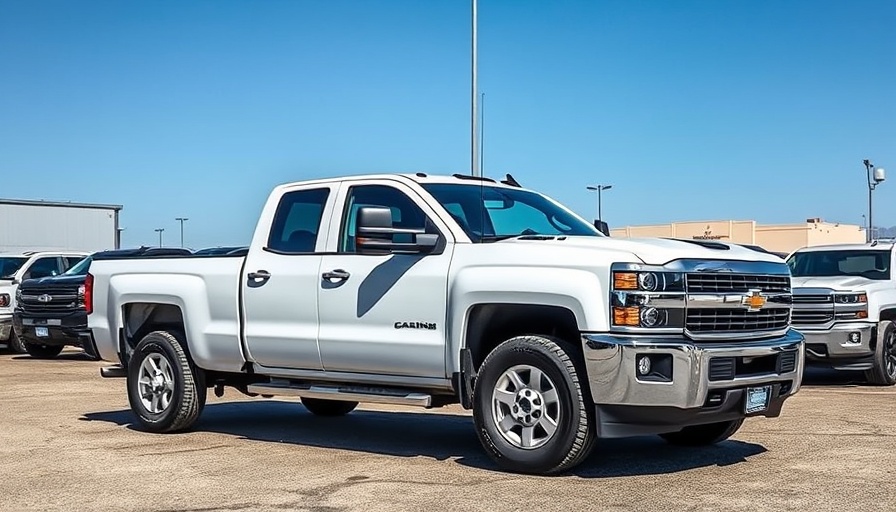
Chrysler's Recall: What You Need to Know
In an important safety move, Chrysler has announced a recall affecting over 10,000 2025 Ram 1500 trucks due to issues with tire pressure monitoring systems. This isn't just a minor inconvenience; it highlights a critical aspect of automotive safety that many drivers often overlook: correct tire inflation. An error in the vehicle's software can lead to misleading tire pressure warnings, posing potential risks for drivers if not addressed promptly.
Understanding the Tire Pressure Warning System
For many vehicle owners, the tire pressure warning light is an occasional nuisance, typically ignored unless it lights up on the dashboard. However, it plays a vital role in ensuring safety on the road. Proper tire pressure contributes significantly to vehicle handling, fuel efficiency, and overall safety. Under-inflated tires can lead to blowouts, bad fuel economy, and increased tire wear, while over-inflated tires can compromise traction and lead to dangerous conditions. This issue, therefore, isn’t just about software errors; it's about the safety of those who rely on the vehicle.
Why This Recall Is Crucial
The National Highway Traffic Safety Administration (NHTSA) pointed out that Chrysler's recall is due to a software glitch that affects the tire inflation pressure readings displayed on the dashboard. If a driver receives an incorrect reading, they may fill their tires incorrectly, putting themselves and others at risk. As homeowners who also drive, it’s important to monitor tire pressure manually until you receive further instructions from Chrysler.
Your Action Plan: What to Do Next
First and foremost, check the tire pressure of your truck using a manual gauge. It’s a simple task that can prevent serious accidents. Follow the guidelines in your owner’s manual for the correct tire PSI (pounds per square inch). Meanwhile, keep an eye on your mailbox. Chrysler will be sending out notifications in early May 2025 to yet-to-be-identified owners.
When the notification arrives, schedule a service appointment to have the software updated. Fortunately, this update will be provided at no cost, ensuring that your truck remains safe to drive.
Stay Informed About Vehicle Safety
Vehicle recalls might seem like distant issues that don't concern you until they do. It's vital to stay informed about your vehicle's status, especially for those of us who depend on trucks for daily tasks involving DIY projects, renovations, or home improvement errands. Keeping your vehicle in good shape not only extends its lifespan but also ensures your own safety and that of your loved ones.
Embrace a Proactive Approach
As you think about your truck, consider the broader picture of vehicle safety. Regular maintenance checks are a must, including tire inspections. Ensure that you’re checking tire pressure monthly, especially with cold weather approaching. In winter months, tire pressure can drop, and performing this simple check can save you from significant and dangerous surprises.
Frequently Asked Questions (FAQ)
Q: How can I manually check my tire pressure?
A: Using a reliable tire pressure gauge, remove the valve stem cap from your tire and press the gauge onto the valve; the reading will indicate the PSI. Ensure it matches your vehicle's recommended levels found in your owner’s manual.
Q: What if my tires are incorrectly inflated?
A: If your tires are too low, inflate them to the recommended PSI. If they are too high, let some air out until you reach the correct level. Doing this regularly can help maintain tire health and improve safety.
Your Safety Is Paramount
Being proactive not only enhances your driving experience but also contributes to safer roads. After addressing the tire pressure concerns, try to take regular stock of your truck’s functionality. Consider investing in a home maintenance toolkit if you haven’t already; being self-sufficient can be empowering!
If you have further questions, don’t hesitate to reach out to FCA customer service at 1-800-853-1403 or consult the NHTSA Vehicle Safety Hotline at 888-327-4236 for more details on recall number 30C. The safety of your vehicle is ultimately your responsibility.
 Add Row
Add Row  Add
Add 




Write A Comment